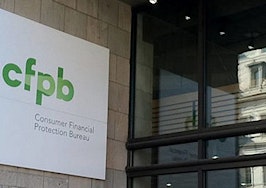- The Financial CHOICE Act would repeal Dodd-Frank's Volcker rule and dismantle many of its mortgage regulations.
- It would also change the scope of authority and name of the CFPB, tweak its structure and eliminate its ability to investigate "unfair, deceptive or abusive acts and practices."
Remember when the Consumer Financial Protection Bureau (CFPB) fined Wells Fargo $185 million for creating unapproved customer accounts to meet sales quotas last September?
Under new legislation passed by the United States House of Representatives yesterday — the Financial CHOICE (Creating Hope and Opportunity for Investors, Consumers and Entrepreneurs) Act — the CFPB’s power to regulate and fine the financial industry would be curtailed significantly.
This could have an impact on real estate agents and brokers as the CFPB is tasked with not only enforcing new mortgage regulations under Dodd-Frank, but also regulations like RESPA, the Real Estate Settlement Procedures Act, which dictates how agents and brokers may interact financially with title and mortgage partners.
The nearly-600-page bill with a 148-page comprehensive summary and a four-page executive summary is dense, to say the least, but can shed light on what the problems with the CFPB’s regulatory powers currently are (according to the House) and how to fix them.
Regulation brings too much (or too little) mortgage credit
“One lesson that should have been learned from the financial crisis is the danger of government intervention in markets for purposes of influencing mortgage credit allocation,” wrote the House Financial Services Committee in the bill’s comprehensive summary.
“Too much credit gave us the great recession. Too little credit keeps the dream of homeownership out of reach for too many Americans. In the words, of C.S. Lewis, it is time for the ‘omnipotent moral busybodies’ in the federal government to learn from their mistakes.”
The committee argues that the mortgage rules outlined in the Dodd-Frank Act “are excluding lower-income or marginal borrowers from the mortgage market altogether.”
It cites a 2013 Federal Reserve report, which found that 22 percent of consumers who bought a home in 2010 would not have met Dodd-Frank’s underwriting requirements.
What would the bill do?
As written, the bill would repeal certain titles and sections of the Dodd-Frank Act, including the Volcker Rule, which restricts banks from making certain kinds of speculative investments and would “provide regulatory relief for Main Street and community financial institutions.”
The changes to the CFPB seem more significant. The bill proposes to:
- Change the CFPB’s name to the Consumer Law Enforcement Agency (CLEA) “and task it with the dual mission of consumer protection and competitive markets, with cost-benefit analyses of rules performed by a newly-formed Office of Economic Analysis.”
- Restructure the CFPB as an executive branch agency with a single director who could be removed by the President at will (this issue is the subject of some court entanglement at the moment), and make the agency subject to Congressional oversight.
- “Eliminate the CFPB’s supervisory function,” making it an enforcement agency.
- The CFPB currently has the authority to investigate “unfair, deceptive, or abusive acts and practices (UDAAP)”; the bill would “remove the agency’s opaque and ill-defined” UDAAP authority.
- Establish an independent inspector general who would be confirmed by the Senate.
- Eliminate the CFPB’s “sweeping market-monitoring function” and require the CFPB to get permission before it collects personally identifiable information from consumers.
- Repeal the Department of Labor’s fiduciary rule — the new one, implemented today, that requires brokers offering retirement savings advice to their clients to put those clients’ interests first, ahead of their own.
- “Promote new investment products and choices with a streamlined application process.”
- Update and “modernize” the corporate governance system “to better promote value creation for public companies and their shareholders.”
House Financial Services Committee Chairman Jeb Hensarling, R-Texas, told reporters on Wednesday that Dodd-Frank “represents the greatest regulatory burden on our economy, more so than all the other Obama-era regulations combined.
“There is a better way: economic growth for all; bank bailouts for none,” he added.
However, legislative experts believe that this bill is likely to meet the same fate as the American Health Care Act: Past the House, it will most probably be dismantled and reassembled (in some fashion) in the Senate before being kicked back to the House for a second round of approval.













